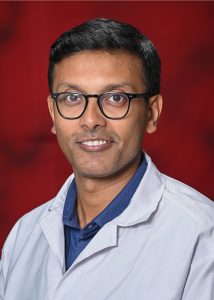Dr. Daipayan Banerjee
| Qualification | B.Tech., Ph.D. |
| Designation | Scientist |
| Proteomics | |
| Aravind Medical Research Foundation | |
| e-mail id | daipayan@aravind.org |

| Qualification | B.Tech., Ph.D. |
| Designation | Scientist |
| Proteomics | |
| Aravind Medical Research Foundation | |
| e-mail id | daipayan@aravind.org |
Dr. Daipayan Banerjee received his Ph.D. in Biology (Molecular Biology) from the University of Kentucky, Lexington, USA, in 2013. His doctoral research focused on elucidating the regulatory mechanisms by which G-patch domain-containing activator proteins modulate the multifunctional RNA helicase Prp43 (DHX15 in humans) in two essential biological processes: nucleoplasmic pre-mRNA splicing and nucleolar rRNA processing.
He completed his first postdoctoral fellowship in the Department of Physiology at the University of Kentucky College of Medicine (2013–2015), where he investigated inflammatory signaling pathways in the context of aging. Dr. Banerjee transitioned into vision science during his second postdoctoral appointment in the Department of Ophthalmology and Visual Sciences at the University of Kentucky and subsequently at the Center for Advanced Vision Science, University of Virginia (2015-2020). His research focused on the molecular pathogenesis of age-related macular degeneration (AMD), particularly the role of the innate immune system. He discovered that reduced DICER1 expression or the accumulation of Alu retroelement RNA in retinal pigment epithelial (RPE) cells during dry AMD leads to the cytosolic escape of mitochondrial DNA, which activates the DNA sensor cGAS (cyclic GMP-AMP synthase). This cGAS-driven signaling cascade induces non-canonical inflammasome activation via interferon-β production and gasdermin D–dependent interleukin-18 release, providing critical insights into the inflammatory mechanisms underlying geographic atrophy, a severe form of AMD (Nature Medicine, 2018). Furthering this work, Dr. Banerjee demonstrated a novel, interferon-independent role of cGAMP, the second messenger generated by cGAS, in activating DNA damage response signaling (Nature Communications, 2021), thereby expanding the known functional repertoire of the cGAS–STING pathway.
In 2020, Dr. Banerjee returned to India to join the Aravind Medical Research Foundation, where he applies his expertise in molecular and cellular biology to investigate the molecular mechanisms of ocular diseases relevant to the Indian population, with the goal of identifying novel biomarkers and therapeutic targets.
Dr. Banerjee’s group is focused on understanding and addressing two prevalent and vision-threatening eye diseases that significantly impact the Indian population: Diabetic Retinopathy (DR) and Pterygium.
Diabetic Retinopathy (DR): India carries one of the highest diabetes burdens globally, with an estimated 101 million diabetics and 135 million pre-diabetics. Diabetic retinopathy, the most severe ocular complication of diabetes, affects approximately 12.5% of diabetic individuals. DR is a progressive retinal disease that can ultimately lead to irreversible vision loss. A major challenge in managing DR is its asymptomatic onset: early stages of the disease do not present noticeable symptoms. Often, symptoms such as floaters, blurred vision, or dark areas in the visual field appear only at advanced stages, such as Vision-Threatening Diabetic Retinopathy (VTDR), including proliferative DR or diabetic macular edema. As a result, diagnosis is frequently delayed, limiting treatment options and increasing the risk of permanent damage. Current limitations include the lack of reliable biomarker panels for early detection/prediction in diabetic population, and no effective therapeutic interventions—beyond strict glycemic control—exist to reverse early-stage disease. Our overarching goal is to develop a predictive biomarker panel for early DR detection and evaluate therapeutic candidates with protective effects against DR progression. We employ proteomics and advanced molecular biology techniques to achieve these objectives.
Pterygium: Pterygium is a common ocular surface disorder with a 12.6% prevalence in India, primarily affecting individuals with high exposure to UV radiation—especially agricultural and outdoor workers. Currently, surgical excision is the only effective treatment, as no pharmaceutical interventions are available to halt or reverse disease progression. This underscores the urgent need to identify novel molecular targets for therapeutic development. Our research utilizes a multi-omics approach—integrating proteomics, transcriptomics, and epigenetics—alongside in vitro cell culture models to dissect the molecular underpinnings of pterygium and screen potential pharmacological inhibitors.
Key Publications: